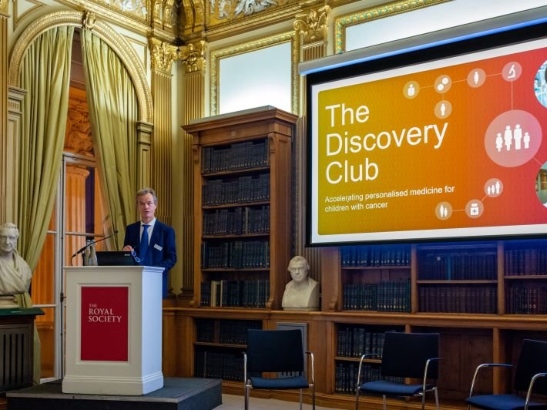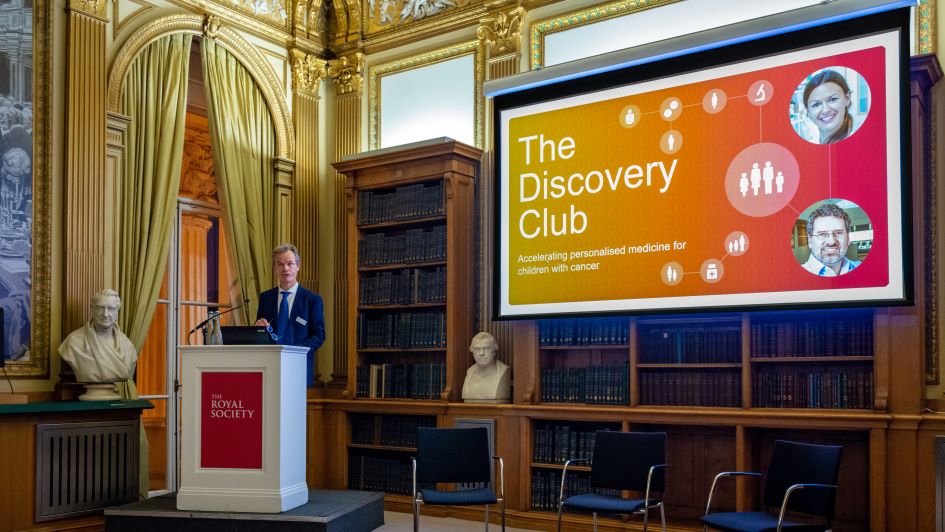
Image: Chief Executive Professor Kristian Helin opens the October Discovery Club: Accelerating personalised medicine for children with cancer. Credit: ICR / ProfotoDesign
Members of the Discovery Club reunited at the Royal Society in London for an intimate evening with some of our leading childhood cancer scientists. Guests also joined virtually from across the UK.
This event marked the first in-person Discovery Club since the start of the Covid-19 pandemic. Last time we were all together was in February 2020, before the first lockdown. Donors’ support has been crucial in helping us keep our labs open so that our lifesaving research can continue.
On 13 October, we shared the latest research advances with Discovery Club members and introduced them to our new senior leadership – Chief Executive, Professor Kristian Helin, and Chair, Professor Julia Buckingham CBE.
Throughout the evening, Discovery Club members heard from Professor Louis Chesler and Dr Alejandra Bruna about their research into understanding the biology of children’s tumours, and how they use this information to discover and develop smarter and kinder treatments for children with cancer.
Unlocking the biology of childhood cancer
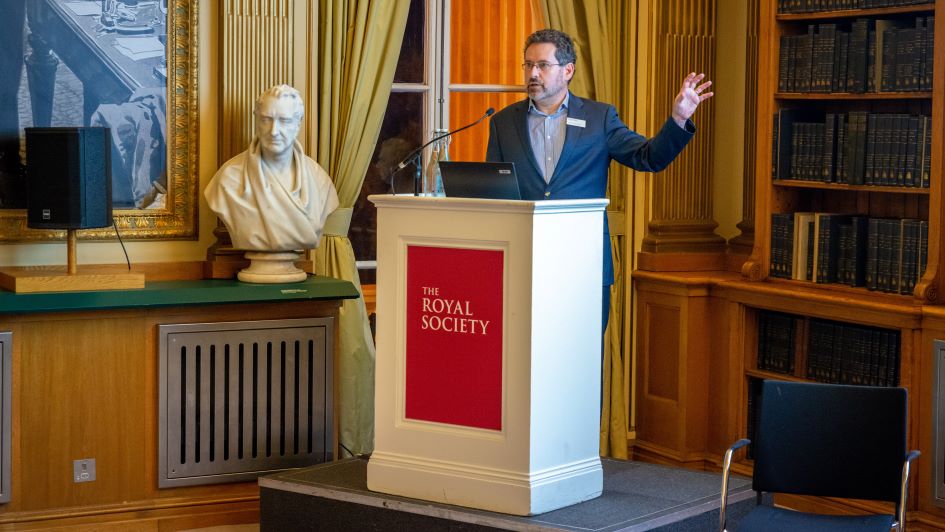
Image: Professor Louis Chesler. Credit: ICR / ProfotoDesign
Professor Chesler leads the Paediatric Solid Tumour Biology and Therapeutics Team at the ICR. His research focuses on the three most common solid tumours of children – neuroblastoma, a nerve tumour, rhabdomyosarcoma, a muscle tumour, and medulloblastoma, a brain tumour.
He also leads the new Centre for Paediatric Oncology Experimental Medicine (POEM), which is identifying and studying the molecular changes underlying the development of childhood cancers and targeting them with innovative new treatments.
Childhood cancers are fundamentally different from adult cancers, he explained. Drugs act as ‘keys’ to unlock the mechanisms driving cancer, but there are more, and more complex, ‘locks’ in adult cancer which can build up over time. Whereas these ‘locks’ may be simpler to decipher in childhood cancers.
He said: “Our hypothesis about paediatric cancer is that these locks are much more significant because there are fewer of them.”
For example, MYCN is a gene that leads to cancer when it develops abnormally in children. MYCN can hijack regular cells at every level and it has a very complex structure which makes it an important but difficult drug target.
Professor Chesler’s team focuses on understanding MYCN through its protein network. By interfering with related complexes that either synthesise RNA for protein or are responsible for the gene’s stability, scientists can turn MYCN on and off.
Chameleon-like cancer
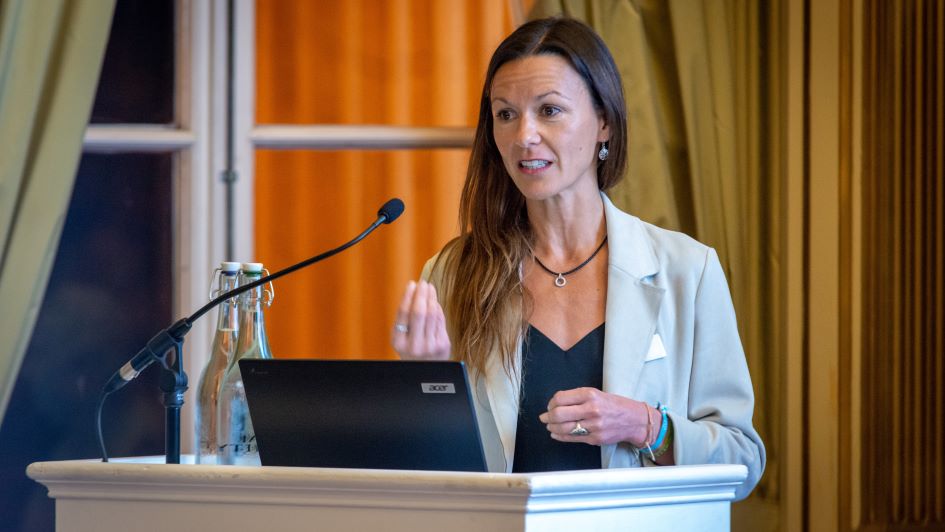
Image: Dr Alejandra Bruna. Credit: ICR / ProfotoDesign
Dr Bruna is a cancer biologist and leads the Preclinical Modelling of Paediatric Cancer Evolution team. She is also one of the newest recruits to POEM and her talk focused on how childhood cancers, like neuroblastoma, evolve and how to treat them accordingly.
One way that cancer evolves is in response to its environment. Dr Bruna likened it to the way a chameleon changes its colour to adapt to its new surroundings. With cancer, cells can either adapt like a chameleon or there may be different types of cells, like different coloured lizards, of which only certain types survive.
New technologies allow scientists like Dr Bruna to take a molecular fingerprint of each cell and capture its changes over time and through treatment. This helps determine whether treatments should try to eradicate ‘chameleon-like’ mutations or prevent mechanisms that lead to a certain type of characteristic.
The crucial role of philanthropic support
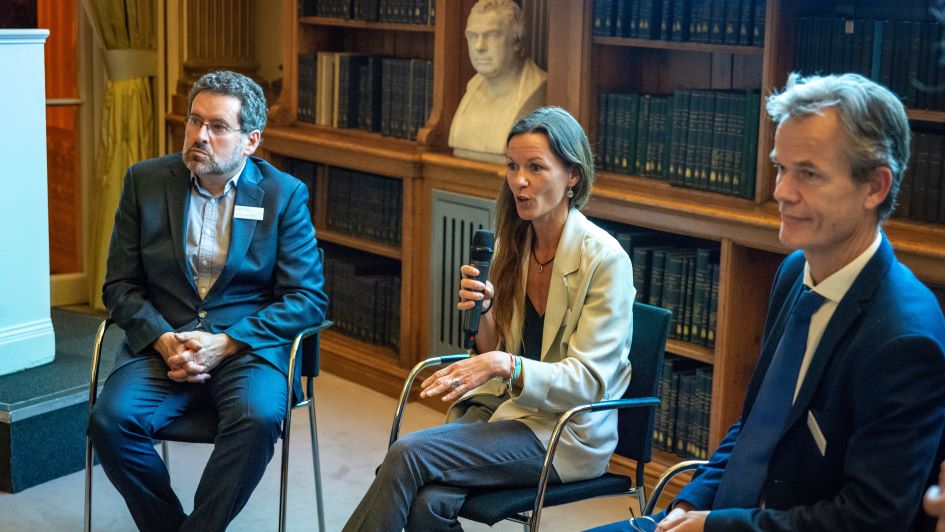
Image: From left to right - Professor Louis Chesler, Dr Alejandra Bruna and Chief Executive Professor Kristian Helin during the Q&A session. Credit: ICR / ProfotoDesign
Speaking at the event, Professor Kristian Helin, our Chief Executive said: “The research we're doing would not be possible without your support and your generosity. Philanthropic support from families and charities has been particularly key for the ICR’s track record of success in developing those kinder and more effective treatments for children with cancer.
“The ICR is a place where you can start from the very early discoveries and take it all the way into the clinic. And it sounds extremely simple, but it's not, it's actually very difficult to create a place like that.”
Help us continue our vital research
Our Discovery Club members are part our generous community of donors, who help us to drive forward our scientific strategy. Their philanthropic investment in key organisational priorities, ensures that new discoveries are brought rapidly into the clinic to benefit patients. This event is one of an annual series to update members on our science and show them how their support is making an impact.
This year, our key priorities are:
- Improving the outlook for people with cancers of unmet need
- Pursuing new lines of enquiry in tackling the DNA damage response
- Training the cancer research leaders of the future
If you would like to find out more about how you can make a difference to our work and to patients’ lives, please contact Hannah Joyce, Deputy Director of Philanthropy.
